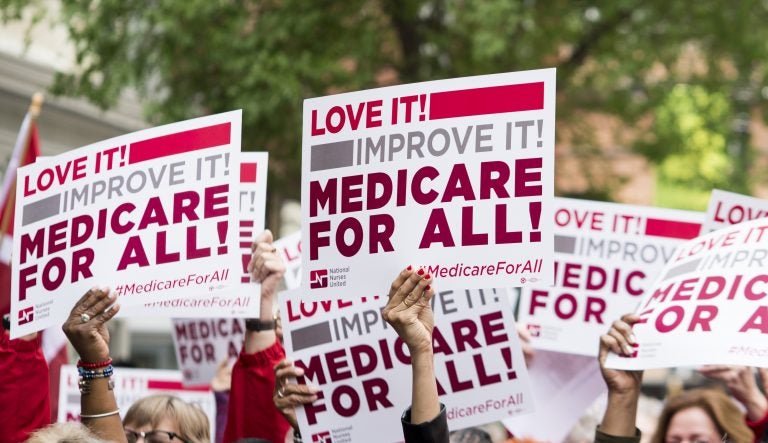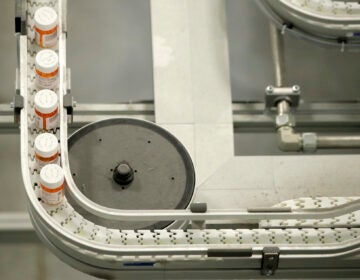Progressive, moderate wings of Democratic Party at odds over ‘Medicare for All’
Currently, the main “Medicare for All” proposal in the House calling for guaranteed health insurance for every American has just over 100 co-sponsors.
Listen 4:31
Members of National Nurses United union members wave 'Medicare for All' signs during a rally in front of the Pharmaceutical Research and Manufacturers of America in Washington calling for 'Medicare for All' on Monday, April 29, 2019. (Photo By Bill Clark/CQ Roll Call via AP Images)
Back in 2016, U.S. Sen. Bernie Sanders, Vermont independent, was laughed off by many pundits as a self-described democratic socialist with a populist agenda. This year, it seems nearly every Democrat running for president is to the left of where Sanders was back then.
Democrat senator and White House aspirant Cory Booker of New Jersey said he’s glad many in the party are proposing sweeping reforms on health care and climate change.
“The planet is in peril, and health care is a right. Those two are incontrovertible … Right now, I’m frustrated that instead of trying to figure out a way to get everybody access to health care in our country and to save our planet, people want to tear down those people who are bold enough to stand up and say, ‘I have a vision and dream for America,’ ” Booker said.
When Obamacare was introduced, Republicans dubbed it “a socialist overreach.” Now, many Democratic presidential candidates are embracing single-payer health care … and the charges of socialism are back with a vengeance.
“It’s just part of this unbelievable lurch to the left and embrace of socialism,” said U.S. Sen. Patrick Toomey, a Pennsylvania Republican. “It’s incredible to me.”
While some area Democrats, including Philadelphia Congressman Brendan Boyle, support “Medicare for All,” Democrat U.S. Rep. Madeleine Dean, a new representative from a district centered in Montgomery County, doesn’t like that policy and the socialism charges that come with it.
“Take a look at the work we’re doing here. Take a look at this majority. It is not driven by socialism. Provocative ideas are healthy. That’s what debate is about. That’s what I love about the diversity of our incoming freshman class,” she said. “We know with greater diversity, you get a generator of greater ideas. I don’t worry about those labels.”
Still, Dean wants everyone to be able to access affordable health care — the intention of Obamacare from its inception and something Dean wants to make real.
“At this point, in terms of the voters, I think the voters say it ought to just be considered a right, and we need to figure out how to do it affordably,” she said.
Currently the main “Medicare for All” proposal in the House has just over 100 co-sponsors, which isn’t even half of the Democratic members of the chamber.
Another one of the new Democrats, Chrissy Houlahan from Chester County, isn’t one of them. She supports a public option allowing Americans to enter the federal health care rolls if private market options continue to be cost prohibitive.
“And if that public option becomes more competitive than the private options, then that’s how the market should work, so those are things that I think are effective solutions for the short term for our health care issues,” Houlahan said.
She would also like to focus on lowering prescription drug costs rather than moving millions of people into government health plans.
“I think, in the future, we have to see how the market reacts to that. And I think we should see what happens when we provide those opportunities,” Houlahan said.
South Jersey U.S. Rep. Jeff Van Drew, another freshman Democrat, is more blunt about the path many are taking his party.
“If we’re going to move into the New Green Deal and ‘Medicare for All,’ especially at the same time, we are no longer going to be the nation that we know. We are going to have to have government controlling a major portion of our lives, taxes would have to go up very significantly, and people’s lives would change and I don’t believe at this point in taking away the insurance that people have,” he said.
Van Drew won a district that is more conservative than many parts of the Garden State. He and other lawmakers were able to flip districts from the GOP because they ran to the middle, Van Drew said, not to the progressive wing of the party.
“You cannot hold the majority in the House of Representatives without moderates. You must have them if you look at the numbers,” he said.
“We have to be tolerant of each other and we also have to ensure that we’re just not the party of higher taxes, higher costs and that we’re not socialists,” said Van Drew, who called himself a “compassionate capitalist.”
Depending on who Democrats end up nominating for president, Van Drew and others trying to hold on to competitive districts will have a choice: Do they want to campaign as part of a big Democratic ticket or tailor their message while distancing themselves from the nominee?
WHYY is your source for fact-based, in-depth journalism and information. As a nonprofit organization, we rely on financial support from readers like you. Please give today.




